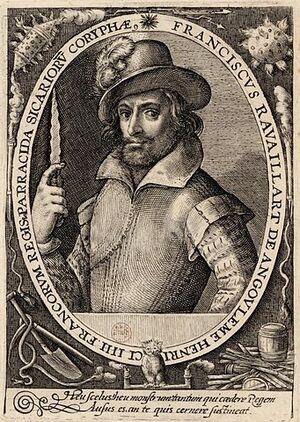François Ravaillac (nonfiction): Difference between revisions
No edit summary |
|||
| (7 intermediate revisions by the same user not shown) | |||
| Line 1: | Line 1: | ||
'''François Ravaillac''' ( | [[File:François_Ravaillac.jpg|thumb|François Ravaillac brandishing his dagger, in a 17th-century engraving.]]'''François Ravaillac''' (1578 – 27 May 1610) was a French factotum in the courts of Angoulême and a regicide. | ||
An occasional | An occasional tutor and Catholic zealot, he murdered King Henry IV of France in 1610. | ||
His father Jean Ravaillac was a violent man whose many misdeeds were a public scandal and caused legal difficulties; his mother Françoise Dubreuil (sister of the canons) was known for her Catholic piety. | His father Jean Ravaillac was a violent man whose many misdeeds were a public scandal and caused legal difficulties; his mother Françoise Dubreuil (sister of the canons) was known for her Catholic piety. | ||
| Line 11: | Line 9: | ||
An application in 1606 for admission to the Society of Jesus was also unsuccessful. | An application in 1606 for admission to the Society of Jesus was also unsuccessful. | ||
== | On May 27 of 1610, he was taken to the Place de Grève in Paris and was tortured one last time before being pulled apart by four horses, a method of execution reserved for regicides. Alistair Horne describes the torture Ravaillac suffered: | ||
<blockquote>Before being drawn and quartered... he was scalded with burning sulphur, molten lead and boiling oil and resin, his flesh then being torn by pincers.</blockquote> | |||
Following his execution, Ravaillac's parents were forced into exile, and the rest of his family was ordered never to use the name "Ravaillac" again. | |||
== In the News == | |||
<gallery mode="traditional"> | |||
</gallery> | |||
== Fiction cross-reference == | == Fiction cross-reference == | ||
* [[ | * [[Extract of Radium]] | ||
* [[Prey to visions]] | * [[Prey to visions]] | ||
== | == Nonfiction cross-reference == | ||
External links: | |||
* [https://en.wikipedia.org/wiki/Fran%C3%A7ois_Ravaillac François Ravaillac] @ Wikipedia | * [https://en.wikipedia.org/wiki/Fran%C3%A7ois_Ravaillac François Ravaillac] @ Wikipedia | ||
[[Category: | [[Category:Nonfiction (nonfiction)]] | ||
[[Category: | [[Category:People (nonfiction)]] | ||
[[Category: | [[Category:Regicides (nonfiction)]] | ||
[[Category:Teachers (nonfiction)]] | |||
Latest revision as of 13:19, 11 February 2018
François Ravaillac (1578 – 27 May 1610) was a French factotum in the courts of Angoulême and a regicide.
An occasional tutor and Catholic zealot, he murdered King Henry IV of France in 1610.
His father Jean Ravaillac was a violent man whose many misdeeds were a public scandal and caused legal difficulties; his mother Françoise Dubreuil (sister of the canons) was known for her Catholic piety.
The son Ravaillac began work as a servant, later becoming a school teacher. Obsessed by religion, he sought admission to the ascetic Feuillants order, but after a short probation, he was dismissed as being "prey to visions".
An application in 1606 for admission to the Society of Jesus was also unsuccessful.
On May 27 of 1610, he was taken to the Place de Grève in Paris and was tortured one last time before being pulled apart by four horses, a method of execution reserved for regicides. Alistair Horne describes the torture Ravaillac suffered:
Before being drawn and quartered... he was scalded with burning sulphur, molten lead and boiling oil and resin, his flesh then being torn by pincers.
Following his execution, Ravaillac's parents were forced into exile, and the rest of his family was ordered never to use the name "Ravaillac" again.
In the News
Fiction cross-reference
Nonfiction cross-reference
External links:
- François Ravaillac @ Wikipedia
